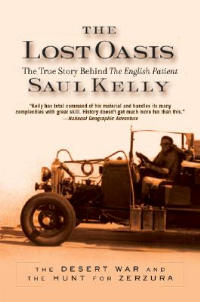 Lost Oasis
Lost Oasis

Here we get the background behind the English Patient fiction: the international bunch of adventurers who opened up the exploration of the Libyan Desert between the wars and then went on to become adversaries in WWII (what a great film that would make!). In case you're wondering, Zerzura is a lost oasis of ancient legend mentioned in the Arabian Nights and Herodotus, and retold to British explorer Wilkinson in the late 1800s - a Shangri-La in the wastes between the outlying oases of the Western Desert and the Depression of Kufra.
What comes out is that behind the chummy search for Zerzura by British chappies and Jonny Foreigner was, sadly, a need for strategic intelligence from the little known Libyan Desert. By the early 1930s Mussolini had pharaonic aspirations in Brit-controlled Egypt and with every trip the blanks on the maps were filled in and handed over.
Of all the characters, Almasy's background and motivations are most intriguing. Even in the book's latter re-telling of daring LRDG escapades, there is still a hint that he was hedging his bets as the war of the Axis powers declined. His own daring Operation Kondor - delivering a pair of hapless agents to Asyut all the way from Cyrennecia via the Gilf - failed to help Rommel's advance, though through no fault of his own. But a decade or more earlier it's still hard to tell whether his urge to explore the Libyan Desert in Egypt and Sudan was purely strategic as hinted, or just a love of adventure inherited from his explorer-father. The competitiveness and envies absent from his own account (see below) are to his credit as the Brits did not take to him at all.
For the record Zerzura was located at that time as the near-barren Wadi Abd el Malik in the western Gilf, where even in the last century Tubu cows were pastured for a few weeks out of Kufra following rain in the Gilf's highlands. Today declining rains see only a few trees and some vegetation survive, but its position between Dakhla, Abu Ballas and Kufra support the legend of a former watering hole for camel-borne raiders from the east which got embellished, as these things do, into a city of splendour, in the way of Timbuktu.
'Zerzura' will only appeal to those who've travelled in the Libyan Desert and have an interest in the protagonists. It doesn't read like the author's been there which is a shame and despite the racy blurb, comes across as a well-researched, fact -heavy and scholarly version of recent and Saharan history.
|